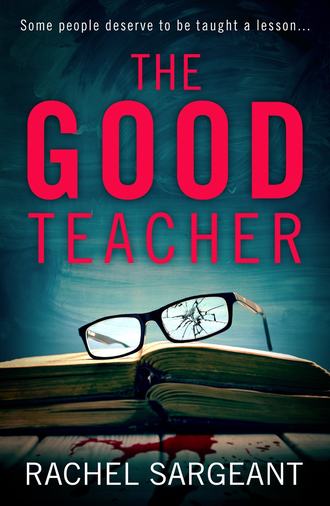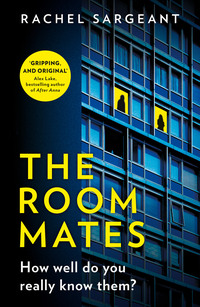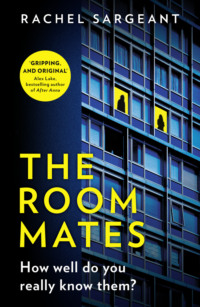
Полная версия
The Good Teacher: A gripping thriller from the Kindle top ten bestselling author of ‘The Perfect Neighbours’

The Good Teacher
RACHEL SARGEANT

A division of HarperCollinsPublishers
www.harpercollins.co.uk
Copyright
KillerReads
an imprint of HarperCollinsPublishers Ltd
1 London Bridge Street
London SE1 9GF
www.harpercollins.co.uk
First published in Great Britain as Long Time Waiting by Robert Hale Ltd 2010
This ebook edition published by HarperCollinsPublishers 2019
Copyright © Rachel Sargeant 2010
Cover design by Andrew Davis © HarperCollinsPublishers Ltd 2019
Cover photograph © Shutterstock.com
Rachel Sargeant asserts the moral right to be identified as the author of this work.
A catalogue copy of this book is available from the British Library.
This novel is entirely a work of fiction. The names, characters and incidents portrayed in it are the work of the author’s imagination. Any resemblance to actual persons, living or dead, events or localities is entirely coincidental.
All rights reserved under International and Pan-American Copyright Conventions. By payment of the required fees, you have been granted the non-exclusive, non-transferable right to access and read the text of this e-book on screen. No part of this text may be reproduced, transmitted, down-loaded, decompiled, reverse engineered, or stored in or introduced into any information storage and retrieval system, in any form or by any means, whether electronic or mechanical, now known or hereinafter invented, without the express written permission of HarperCollins.
Ebook Edition © January 2019 ISBN: 9780008327224
Version: 2018-10-23
Table of Contents
Cover
Title Page
Copyright
Chapter 1
Chapter 2
Chapter 3
Chapter 4
Chapter 5
Chapter 6
Chapter 7
Chapter 8
Chapter 9
Chapter 10
Chapter 11
Chapter 12
Chapter 13
Chapter 14
Chapter 15
Chapter 16
Chapter 17
Chapter 18
Chapter 19
Chapter 20
Chapter 21
Chapter 22
Chapter 23
Chapter 24
Chapter 25
Chapter 26
Chapter 27
Chapter 28
Chapter 29
Chapter 30
Chapter 31
Chapter 32
Chapter 33
Chapter 34
Chapter 35
Chapter 36
Chapter 37
Chapter 38
Chapter 39
Chapter 40
Acknowledgements
Loved The Good Teacher? Enjoy the New Psychological Thriller From Rachel Sargeant…
About the Author
About the Publisher
Chapter 1
Her back aches like hell. She tries for the hundredth time to read her watch but can’t see her wrist, no matter how far she cranes her neck. The hot metal handcuffs cut into her arm and send pain searing up to her shoulder. It might be broken, but fractures are worse than this; she knows that. Her body has taken a pummelling but the bruises will heal.
She shifts her buttocks, peeling the thick pyjama trousers from her clammy thighs. She’s in the lounge on a kitchen chair, old with paint splatters, the remnants of previous decorating forays. White speckles from several ceilings, large splodges of powder-blue bathroom sheen, and buttercup, pink and cherry from the nursery project. Happy days long gone. She’s never had to sit for so long in this chair. She usually perches on its hard edge long enough to force down a couple of cream crackers and a cup of camomile tea. Even the leisurely Sunday breakfasts are a thing of the past.
Reg Kenny weaves across the lane, taking care not to stray off the tarmac. Not that it would matter much – although the thick grass verge is soaked in dew, the ground below is rock hard. As he pedals, he feels sweat on his forehead. It’s going to be another scorcher. Doreen doesn’t know what she’s missing and he isn’t going to tell her. His early morning cycle rides are his only escape from the infernal woman. And besides he has his little detour ahead of him. He pedals faster at the thought of what lies ahead and breathes harder, taking in the country freshness.
The chance to freewheel downhill fuels his good humour. The riotous hedgerows rushing by, the morning birds in full voice, the warm air on his face. And the sun glinting through the trees that line the road – his road – through Martle Top, the one little bit of countryside between Penbury and the motorway. The car parked in the lay-by annoyed him earlier. The thoughtlessness of some people: radio blaring, passenger door wide open, driver probably stopped for a pee in the ditch. Just as well Reg didn’t see him. He’d have given him a piece of his mind. Still, he’s nearly there now. His stomach flutters and there’s a delicious prickle through his shoulders. He’s like this every time. The first few days he thought it was guilt, but he knows now it’s the thrill of anticipation.
Raging thirst replaces the hunger pangs. Her forehead throbs and it’s hard to swallow. She tries not to panic.
If only the curtains were open a crack, the postman might have spotted her through the window and called the police. After the sharp thwack of the letterbox, she heard his “This Is Me” whistling fade away down the gravel path. She tried to call out but, with the tape over her mouth, she only managed a pathetic humming sound that had no hope of reaching the man chirping off into the warm June morning. She hates those curtains now, garish with the broad daylight behind them. Their peach colour makes the room loud and stuffy, hurting her eyes and aggravating her headache. A clashing backdrop for the vase of dark red roses on the table, their pungent perfume tainting what precious clean air she has left. A familiar wave of nausea threatens, but she fights it off.
Reg chains his bike to the railings and walks briskly into the Little Chef. Why should he feel guilty?
Doreen’s fault. She shouldn’t have withdrawn her services. A grown man has his needs.
The chain digs into her ribcage whenever she arches her back, forcing her to slump into the seat. The carriage clock ticks behind her. Oh for a clock that chimes. At least she’d be able to count off the hours. She daren’t rock round to face the mantelpiece. If she topples over, she’ll bang her already-raw face into the hard floor. And it isn’t just herself to think about. She has to keep pain to a minimum; she might have to wait all day.
To deaden the ache in her neck, she rests her heavy arms on the chair and moves her knees apart, easing the pressure on the handcuffs around her ankles. But now it’s even harder to hold her bladder, so she squeezes her legs together again. If she wants to avoid wetting herself, she’ll have to accept the intermittent burning sensation up her calves.
Reg swings his leg over the saddle and sets off home replete. He deserved his cooked breakfast. That puny porridge Doreen serves up since he retired wouldn’t keep a toddler fed.
He gets off his bike again. The hill’s getting steeper. He used to be able to cycle up it. Better not tell Doreen. She’ll say he’s past it. Men of his age can’t expect to do so much. Stupid woman.
“It’s just gone five past eight on Mids FM and on the line now is Carole in Briggham. Hi, Carole,” a radio shouts, polluting Reg’s country air. That bloody car in the lay-by is still there. No driver or passenger about. What on earth are they playing at? A crude thought creeps into Reg’s mind and he smiles. He pushes the bike across the road, quickening his pace.
He peers through the open passenger door. Well, there’s no one at it on the back seat. Hardly surprising. That shrieking radio would put anyone off. Reg lays his bike in the long grass. They must be in the ditch or the field beyond. You’ve got to admire their stamina. They’ve been down there longer than it’s taken him to ravish his Olympic Breakfast with extra mushrooms. With the stealth of a marine commando, he moves towards the ditch. Perhaps he’ll share this one with Doreen. It might put her in the mood for some how’s your fath—
“Father God in Heaven,” he gasps and stands stock-still, the taste of bile mounting in his mouth. His eyes fix on the glint of metal and the shiny patch of red seeping through the grass. In the next instant, stomach heaving, he’s back on his bike, tackling the rest of the hill from the saddle.
The milkman came at about 6.30 a.m. – at least she assumes it was 6.30 a.m. because that’s when he always comes. His chinking of bottles is often the first sound she hears on waking. This morning, frozen by the enormity of her situation, she didn’t think to call out to him until she heard the clanking, whirring sounds of his aged milk float dying away as it left. Hers is the only house in the street that still has milk delivered.
The final spin of the washing machine behind the closed kitchen door filled the silence after that. Then time became vast and empty until the whistling postman. The mail usually arrives before 8 a.m. despite changes at the Post Office, so that must make it about 9 a.m. now.
There’s a distant crunching outside. More steps follow and grow louder as they trip their way up the gravel. It must be Linda. Of course, it’s nine o’clock. Linda and Dean will have dropped the children off at school and then come to pick her up, as arranged. She pictures Linda teetering up the path, her broad feet forced into tiny sandals.
In the background a car engine rumbles. She’s amazed that she can hear it above her hammering heart. Dean will be waiting in the car. She hears a light tapping on the front door glass. Linda’s false fingernails. She forms the words “Linda, help” at the back of her mouth, trying to force them through the heavy adhesive that clamps her jaws together.
“Gaby, are you in there?” Linda’s voice invades the house through the opened letterbox. “Are you going to let me in?”
With all her might, she gulps out one more “Help”. The sound reverberates in her ears and, for a moment, she thinks it’s reached the front door. The letterbox snaps shut and footsteps move around the house towards the lounge window. She rocks against the chains, causing two of the chair legs to lift and then slam down with a muffled thud on the carpet.
“Dean, she must have forgotten.” Linda’s voice is directed away from the house. “I’ve put their milk in the bushes otherwise it’ll be honking in this heat.” Linda’s jerky steps return past the front door and recede down the path, the sound of gravel scattering in their wake.
Gaby struggles to catch her breath as a car door closes and the car speeds away. Tears prick her eyes. Her best hope of rescue will be joining the Penbury ring road without her. Crying makes her head throb, but she weeps on. The fight flowing out of her.
Reg – ice-numb now despite the heat – tries to lean his bike against the potting shed but it slips, clattering to the ground. The noise brings Doreen to the back door.
“Where the heck have you been all this time?” She squints at him. “You look peaky, a bit like your porridge looked before I chucked it. I suppose you want me to get you something else now?”
“Whisky,” Reg gasps.
What time is it now? Exhaustion giving way to panic again. How long can she survive without a drink? It’s been hours and her lips feel like crumbling plaster. Gaby makes another effort to calm down by breathing in through her nose and letting the air slowly reach her lungs. She clutches at any passing thought to occupy her aching mind. The letters on the doormat. She likes getting letters, even if most are mailshots. Her thoughts wander to the postman. She blinks back tears again, regretting that she’s never really looked at him before and wondering whether there’ll ever be another chance.
A car pulls up outside the gate. The engine stops and a door slams. Heavy shoes trudge along the gravel accompanied by faint crackling voices like a radio. She breathes in sharply, preparing to hum out as before, but this time ready for disappointment.
“Yes, sarge. If there’s no reply, we’ll force entry,” a calm voice says on the other side of the front door.
Gaby’s breathing quickens and she can hardly believe her ears. She’s in some other world, unable to move. Seized by terror, suddenly afraid to end her familiar incarceration after so many hours. But then her survival instinct takes hold and she presses against the chains, rocking back and forth, willing herself closer to the window. After hearing three sharp knocks at the door, she crashes to the carpet. Shattering pain spreads across the side of her face. Everything numbs and darkness comes.
Chapter 2
I scramble up the metal staircase inside the south entrance to Penbury Police HQ. Late. Should have taken the car instead of waiting for the bus, but I was flustered enough without getting behind a hot, sticky steering wheel. I try taking the steps two at a time, but the thick woollen tights drag on my knees. Unseasonal legs, and slow, but ladder-free at least. I tried my best with my mother’s honey blush tights, but the minute I tore open the packet and the two bits of beige nylon flopped down, I knew they were designed for an underfed tenyearold. And that was before their accident.
I up my pace and clamp my shoulder bag to my side – my one act of rebellion against Mum’s restyling efforts.
“Now all you need is a briefcase,” she trilled at the end of our shopping session.
“But I have to be approachable, Mum – a friendly face serving the whole community.”
“Really, Pippa, darling, you sound like that rather grand lady officer they keep interviewing on the local news.”
I swelled with pride when Mum made that comparison. I haven’t met Superintendent Chattan yet, but I’ll settle for having half the poise the woman exudes in her television appearances.
At the top of the stairs I slow down, trying to get my breathing under control. My bag’s heavy, too much fodder inside. Pink lipstick from Mum, change for the bus home, tissues, sweets, apples, the Penbury CID Induction Pack and a small handmade card in joined-up writing: Good Luck, Sis. Love Jamie.
Rushing along the narrow corridor past the glass-panelled general office, I tell myself I’m not all that late, but I catch sight of four heads already barricaded behind high in-trays and jumbles of phone consoles and computer screens. I break into a trot and wonder which workstation mine will be. What if my new colleagues don’t rate me? Being late on day one isn’t the best way to win them over. They might not speak to me – I hate silences. Hopefully I’ll be out on the road most of the time.
I touch the buttons on my jacket. Too formal? Another idea of my mother’s. Now you don’t have to wear that ghastly uniform anymore. After trouble with toothpaste spatters, I had to change out of her pink lace blouse selection into a royal blue T-shirt, an old favourite. It looks good with the jacket – so long as I don’t undo the buttons to reveal its full glory. If the weather forecast is anything to go by, I’ll have to boil.
Through the chipped double doors, across the stairwell and into the corridor beyond, I reach a line of varnished wooden doors, each bearing a nameplate. I stop before the first one: Detective Inspector Liz Bagley. I re-check my jacket buttons.
I’m about to knock when the door flies open and two unsmiling figures appear. One I recognize as Mike Matthews, the sergeant from my interview panel. But it’s the woman with him who seems more familiar. A mass of dark hair, toned face and full red lips. DI Bagley or Cher?
“You’re late, DC Adams,” she says. A small woman, she has to tilt her head to meet my eye. Her black curls quiver. The fierce northern accent is pure Rottweiler.
“I’m sorry, I …” I wrack my brain for a plausible explanation that doesn’t involve Colgate or laddered tights. “I, ma’am, well, I …”
Bagley steps through the door and forces me aside, barking her orders at high speed. “There’s been a murder and an assault. Almost certainly connected. You go with DS Matthews. He’s your supervising officer. He’s meeting Forensics at the assault scene.”
She breezes past, short strides, high boots, dancing gingham skirt, and stops at the far end of the corridor to lob Matthews an afterthought. “I’ll be on Martle Top, but try and manage without me.”
“Yes, ma’am,” he calls. When the wired-glass fire doors bang shut behind her, he mutters, “Ride ’em, cowboy.”
I grin but Matthews’s face hardens. “The car’s in the yard,” he says and sets off. I rush after him.
We reach the car and he manoeuvres it out of a tight space and is soon moving at speed along the street outside the police station. He hasn’t spoken since the corridor and gives no indication of remembering me from the interview. At the time, he didn’t make much of an impression on me either. His questions were about simple textbook scenarios. I’d been awestruck by the other interviewer, DCI James Hendersen, a booming bear of a man determined to trick me with a heavy cross-examination. Matthews appeared meek in comparison.
As DS Matthews drives through the drab industrial part of town, I study him out of the corner of my eye: smart trousers, crisp, short-sleeved shirt and tie. Most of the young detectives I’ve met who made the move from PC to DC swap one uniform for another, namely jeans and a leather jacket. He must have a “dress to impress” mother like mine, or maybe he has a wife.
After a while, I break the silence. “Where are we going?”
“To the attempted kidnap scene.”
“Oh, right. Good,” I say, trying to sound on the ball. When Matthews doesn’t elaborate, I add, “Where is that exactly?”
“A house in Southside.” He touches the brake to give the car in front time to turn off.
“Who’s been kidnapped?” I ask. “Is it a siege situation?”
“I don’t think we’d put you through a siege on day one.”
I feel myself reddening and the silence returns. He seemed innocuous at the interview. What little I can remember of him was of someone sympathetic, about my age, on my side. Perhaps he isn’t as young as I first thought. There’s a slight furrowing on his forehead as he concentrates on the driving but the rest of his face is line-free. In his late twenties? Five years my senior at most. He’s clean-shaven – the sort of man Mum would approve of, except for the haircut, if you can call it that. Wild Afro extends as far as his shirt collar. It puts me in mind of my father’s photographs of touring Jamaican musicians in his early days with the Midlandia Symphonic. Odd that Matthews takes care over the rest of his appearance but has hair left over from the 1970s.
He turns the steering wheel to take a left and catches me looking. I cover my embarrassment by asking another question. “Have the kidnappers been arrested?”
“They tied up a Mrs Gaby Brock in her own home and scarpered. Uniform found her.” He moves out past a parked car.
“Who reported it?” I ask, gaining confidence. I seem to have persuaded him to brief me about the case.
“No one.” He flicks the indicator and turns left again, yanking down the sun visor against the head-on sunlight. We’re in a residential district – rows of tight terraces with postage-stamp front gardens.
“How did we know to look for her?” I choose the word “we” carefully. I can’t bring myself to say “uniform”, not ready to detach myself from my former colleagues.
“Because her husband was found murdered this morning in a ditch at Martle Top, close to his own car, by a pensioner on his bicycle. Stabbed in the chest. Knife by the body.” He looks at me, apparently hoping for some sign of revulsion.
He’s read me right. As my stomach muscles clench, I make a desperate attempt at humour. “It sounds like an Agatha Christie to me.”
I realize my mistake even before all the words are out. Matthews takes his eyes off the road and looks me full in the face. “You what?”
My mouth still not shut, more words tumble out. “In many of her novels, the murderer sets up the scene. You can tell—”
Matthews touches the brakes, nudging us both against our seat belts. “Agatha Christie. Now I’ve heard everything. Don’t tell me I’m working with Miss Marple for the next six months,” he says, not smiling.
“It was a joke.” Don’t detectives have a sense of humour? I’m suddenly homesick for the camaraderie of uniform. Getting through the day with easy banter and Sergeant Conway treating us like favourite nieces and nephews.
Matthews puts the car into gear and continues at a slower pace. We enter a leafy residential area that I recognize as Southside, so named when the town was little more than a village. These days it would be more aptly called Eastside, the town having sprawled out below it.
“This isn’t a joke,” he says angrily. “Know the facts before you laugh about it. These are real-life victims. Gaby Brock was found lying on the floor, shackled to a chair in her own lounge. There was a chain round her legs and across her chest. Her wrists were handcuffed to the chair legs. The keys for the padlocks were in the pocket of the pyjamas she was wearing when uniform got there. And before you get any other fanciful ideas, she couldn’t have snapped the cuffs shut on her own arms and then pocketed the keys.”
“Has the victim been able to say anything?” I try to make my voice sound brisk and efficient.
“They were asleep when two men burst in, gave them both a beating, made her husband tie her up and then dragged him out of the house. It appears they took him to Martle Top in his own car and knifed him. Sounds like drugs to me. Shades of the Easter Day shooting in Briggham.”
I’ve heard of the Briggham case. It’s said to have all the hallmarks of a gangland contract. I feel a twinge of excitement at the thought of what this new case might involve, but decide against quipping to Matthews that he needs to know his facts before judging it to be drugs-related. Somehow I don’t think he’d see the funny side.
He switches off the engine as we pull up across a driveway in a short road of newish detached houses, their dull frontages enhanced by conifers and flowering shrubs. Several hydrangeas are in full bloom at the house in front of us. Someone has stuck a pint of milk under one. But what sets this house apart from its neighbours is the blue and white Police Do Not Cross tape all round its perimeter and a police officer, whom I don’t know, standing outside the open front door. When she sees Matthews, she lets us step under the tape without question.






